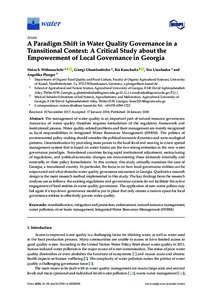View/
Date
2018-01-01Author
Withanachchi, Sisira SaddhamangalaGhambashidze, GiorgiKunchulia, IliaUrushadze, TeoPloeger, AngelikaSubject
630 AgricultureMetadata
Show full item record
Aufsatz
Artikel (Publikationen im Open Access gefördert durch die UB)

A Paradigm Shift in Water Quality Governance in a Transitional Context: A Critical Study about the Empowerment of Local Governance in Georgia
Abstract
The management of water quality is an important part of natural resource governance. Assurance of water quality therefore requires formulation of the regulatory framework and institutional process. Water quality-related problems and their management are mainly recognized as local responsibilities in Integrated Water Resources Management (IWRM). The politics of environmental policy-making should consider the political economic dynamics and socio-ecological patterns. Decentralization by providing more power to the local level and moving to a new spatial management system that is based on water basins are the two strong entreaties in the new water governance paradigm. Transitional countries facing rapid institutional adjustment, restructuring of regulations, and political-economic changes are encountering these demands internally and externally in their policy formulations. In this context, this study critically examines the case of Georgia, a transitional country. In particular, the focus is on how local governance entities can be empowered and what obstacles water quality governance encounters in Georgia. Qualitative research design is the main research method implemented in this study. The key findings from the research analysis are as follows: the existing regulations and governance system do not facilitate the active engagement of local entities in water quality governance. The application of new water polices may fail again if a top-down governance model is put in place that only creates a narrow space for local governance entities to effectively govern water quality.
Citation
In: Water. - Basel : MDPI. - 2018, 10 (2), 98, 1-27Sponsorship
Gefördert durch den Publikationsfonds der Universität KasselCollections
Publikationen (Fachgebiet Ökologische Lebensmittelqualität und Ernährungskultur)Artikel (Publikationen im Open Access gefördert durch die UB)
Citation
@article{urn:nbn:de:hebis:34-2018020654521,
author={Withanachchi, Sisira Saddhamangala and Ghambashidze, Giorgi and Kunchulia, Ilia and Urushadze, Teo and Ploeger, Angelika},
title={A Paradigm Shift in Water Quality Governance in a Transitional Context: A Critical Study about the Empowerment of Local Governance in Georgia},
year={2018}
}
0500 Oax 0501 Text $btxt$2rdacontent 0502 Computermedien $bc$2rdacarrier 1100 2018$n2018 1500 1/eng 2050 ##0##urn:nbn:de:hebis:34-2018020654521 3000 Withanachchi, Sisira Saddhamangala 3010 Ghambashidze, Giorgi 3010 Kunchulia, Ilia 3010 Urushadze, Teo 3010 Ploeger, Angelika 4000 A Paradigm Shift in Water Quality Governance in a Transitional Context: A Critical Study about the Empowerment of Local Governance in Georgia / Withanachchi, Sisira Saddhamangala 4030 4060 Online-Ressource 4085 ##0##=u http://nbn-resolving.de/urn:nbn:de:hebis:34-2018020654521=x R 4204 \$dAufsatz 4170 7136 ##0##urn:nbn:de:hebis:34-2018020654521
<resource xsi:schemaLocation="http://datacite.org/schema/kernel-2.2 http://schema.datacite.org/meta/kernel-2.2/metadata.xsd"> 2018-02-06T15:11:32Z 2018-02-06T15:11:32Z 2018-01-01 2073-4441 urn:nbn:de:hebis:34-2018020654521 http://hdl.handle.net/123456789/2018020654521 Gefördert durch den Publikationsfonds der Universität Kassel eng Urheberrechtlich geschützt https://rightsstatements.org/page/InC/1.0/ standardization mitigation and protection enforcement natural resource management water pollution river basin management Integrated Water Resources Management (IWRM) 630 A Paradigm Shift in Water Quality Governance in a Transitional Context: A Critical Study about the Empowerment of Local Governance in Georgia Aufsatz The management of water quality is an important part of natural resource governance. Assurance of water quality therefore requires formulation of the regulatory framework and institutional process. Water quality-related problems and their management are mainly recognized as local responsibilities in Integrated Water Resources Management (IWRM). The politics of environmental policy-making should consider the political economic dynamics and socio-ecological patterns. Decentralization by providing more power to the local level and moving to a new spatial management system that is based on water basins are the two strong entreaties in the new water governance paradigm. Transitional countries facing rapid institutional adjustment, restructuring of regulations, and political-economic changes are encountering these demands internally and externally in their policy formulations. In this context, this study critically examines the case of Georgia, a transitional country. In particular, the focus is on how local governance entities can be empowered and what obstacles water quality governance encounters in Georgia. Qualitative research design is the main research method implemented in this study. The key findings from the research analysis are as follows: the existing regulations and governance system do not facilitate the active engagement of local entities in water quality governance. The application of new water polices may fail again if a top-down governance model is put in place that only creates a narrow space for local governance entities to effectively govern water quality. open access In: Water. - Basel : MDPI. - 2018, 10 (2), 98, 1-27 Withanachchi, Sisira Saddhamangala Ghambashidze, Giorgi Kunchulia, Ilia Urushadze, Teo Ploeger, Angelika doi:10.3390/w10020098 </resource>
The following license files are associated with this item:
Urheberrechtlich geschützt

